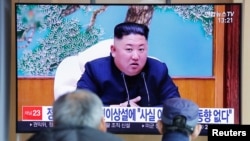North Korea says it will cut off all lines of official dialogue with South Korea, the latest escalation, some analysts say, in Pyongyang’s effort to unilaterally ramp up tensions with Seoul.
Starting at noon local time Tuesday, North Korea will “completely cut off and shut down” four separate communication channels, including at a liaison office near the border, a military communication hotline, and a line between North Korea’s ruling party and South Korea’s presidential office, according to North Korean state media.
“This measure is the first step of the determination to completely shut down all contact means with South Korea and get rid of unnecessary things,” said the state-run Korean Central News Agency.
As justification for its decision, North Korea cited the activities of South Korean activist groups, who for years have floated anti-Pyongyang leaflets across the border.
“They dared to hurt the dignity of our supreme leadership and mock the sacred mental core of all our people,” KCNA said.
Over the past week, North Korea has angrily complained about the leaflets, which are often sent over the border via balloon.
South Korea, which desperately wants to improve inter-Korean ties, had tried to placate the North’s concerns by vowing to legislate a formal ban on such launches. Local police also blocked at least two recent attempts by activist groups to send materials over the border.
But despite those concessions, North Korea has continued to generate the sense of an inter-Korean crisis, an apparent attempt to extract further concessions from the South.
Ramon Pacheco Pardo, a Korea specialist who teaches at King’s College London, says North Korea may also be indirectly pressuring Washington via Seoul.
“I think that North Korea has every incentive to ramp up tensions with Seoul until the U.S. election. The South Korean government will have to take the hit, and there is little it can do,” Pacheco Pardo says.
With two years left in his five-year term, South Korean President Moon Jae-in has recently indicated he will make a final push to improve relations with North Korea.
But with the U.S.-North Korea nuclear talks stalled, international sanctions against Pyongyang remain in place, greatly limiting South Korea's ability to move forward with planned economic and other projects with the North.
In the U.S., President Donald Trump has deprioritized negotiations with North Korea, instead focusing on his re-election campaign, the coronavirus pandemic, and nationwide protests against racism and police brutality.
Amid the stalled nuclear talks, North Korea has gradually ramped up tensions. Most notably, it has repeatedly tested short-range ballistic missiles and other weapons. Trump has shrugged off those launches but has hinted he would be unhappy with a more serious North Korean provocation.
“I think that with ICBM and nuclear tests not really an option, North Korea has to try everything it can. This [move to cut off communications with the South] falls into that category in my view,” says Pacheco Pardo.
North Korea is seeking sanctions relief and security guarantees from the United States. But Trump has been reluctant to offer that unless Pyongyang agrees to completely abandon its nuclear program.
Domestic issues
North Korea may also have domestic reasons for escalating tensions with the South.
Some analysts say North Korea’s move may be meant to distract attention away from the country’s economic problems.
Many North Koreans were already unhappy with the economy, which has been held back by the sanctions. The coronavirus pandemic has only made things worse.
North Korea may also be using the inter-Korean tensions to raise the public profile and solidify the political standing of Kim Yo Jong, the sister of North Korean leader Kim Jong Un.
In recent days, Kim Yo Jong has issued strongly worded statements slamming South Korean activists who launch leaflets across the border.
According to KCNA, she, along with senior North Korean official Kim Yong Chol, ordered the latest decision to cut off communications with Seoul.
"They discussed phased plans for the work against the enemy in order to make the betrayers and riff-raff pay for their crimes," the KCNA report said.
That combative stance is a role reversal for Mrs. Kim, who struck a more conciliatory tone in 2018 when she visited South Korea as the North’s special envoy.
But some suspect her tone may eventually change yet again, if North Korea later decides to “fix” inter-Korean relations.
“I have no doubt that Kim Yo Jong is mentioned in the North Korean media on an issue in order to send a signal internationally, elevate her visibility domestically, and so she can receive credit later for an accomplishment planned by the regime,” says Leif-Eric Easley, a professor of international studies at Ewha Womans University in Seoul.





